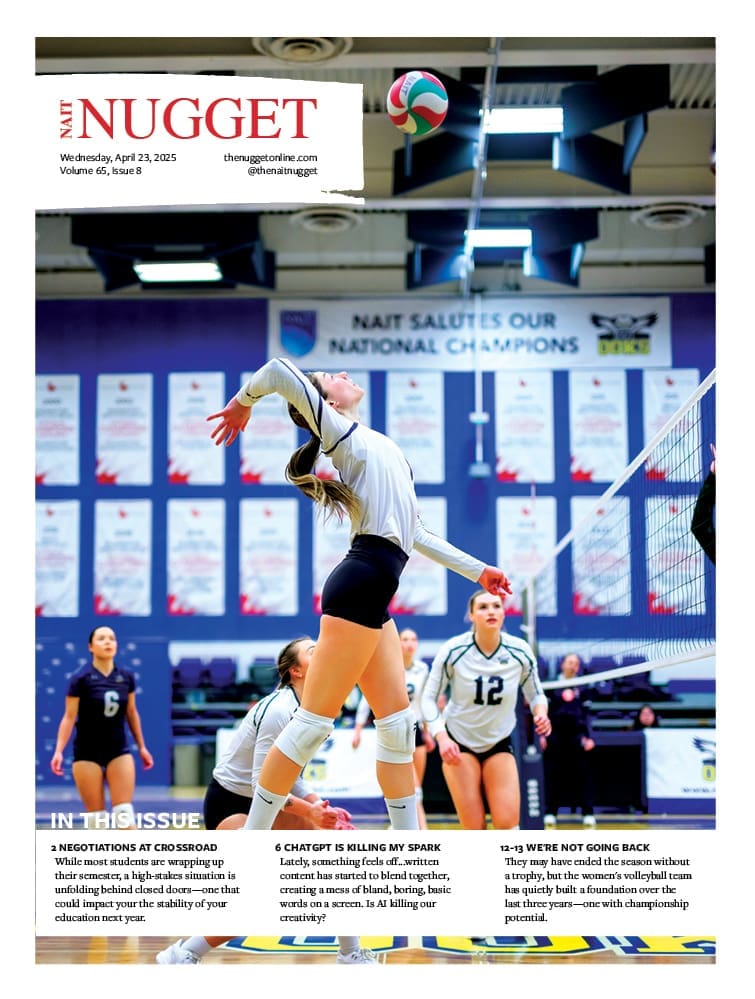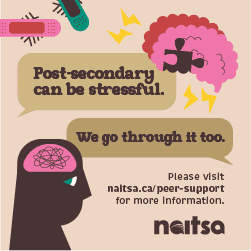Do you have a fear of public speaking? You may have a case of glossophobia. Glossophobia is the fear of public speaking, a fear approximately 40 per cent of the population has, according to a 2001 study.
If you are like me, you hate it. But it’s a requirement for some classes, especially if you are a business student. These are some tips to help you with public speaking.
Tip 1: Seek out public speaking seminars
Last year, NAIT hosted a public speaking seminar by Carmen Leibel of Project Five. Leibel is a former CTV news anchor who founded her own company on how to speak publicly with confidence. One thing her seminar teaches is akin to the five D’s of dodgeball. There are five P’s of public speaking: prepare, practice, pace, position and present.
Which of these tips are the most important? Practice, Leibel said in a recent interview. “Practice saying your presentation aloud.” Even with group presentations, practice is important. “Practice to learn opening together, because when you start out strong, when you have a strong opening as a group, you gain the attention of your audience.”
I tested these tips out for two of the three presentations I had to do in the last week of classes last term. In the two presentations I used these tips, I got 90 per cent and 100 per cent. When I didn’t? 66 per cent. That’s enough evidence for me to prove these tips worked.
Tip 2: Don’t make it painful for your audience
Learn from your past presentation. If you are a third-year student still making the classic mistake of reading from a script, did you even go to a first-year communication course? Have you ever watched an exciting presentation where the presenter reads from a script and does not make eye contact with anyone?
I watched an entire presentation like that last year, and it was painful. What made it worse was that it was a 30-minute presentation. It was an accidental lesson on how not to do a PowerPoint presentation.
Related: Level up your resume with these tips from NAIT Career Services
Leibel added that avoiding eye contact is one of the worst things you can do in a presentation. “If you don’t look up and [don’t] connect with your audience, you’re going to lose them, if you don’t make eye contact with different people in the room,” Leibel suggested. “Make eye contact with your instructor,” she added as another tip.
Scripting makes you sound robotic. Instead, create a grocery list of topics you want to cover in a presentation, as Joel Schwartzberg of Harvard Business Review suggested.
I have scripted, but having a notebook with the topics I want to cover has made me a better public speaker. I only use a script when it relies on the precise wording of a joke I prepared beforehand.
Tip 3: Use humour and be an entertainer
People like to laugh. According to Allison Shapira, who wrote “Speak with Impact: How to Command the Room and Influence Others,” cracking jokes will show confidence in your topic. You just wrote a 10-page paper on the topic; shouldn’t you know about it?
Make sure you know your audience; do not tell jokes about dark or sensitive subjects. I love dark humour, but it’s a hard thing to do right. You do not need to be a stand-up comic and do a tight five. Find your comedy style and embrace it. I have been told I have a sense of humour drier than a scarecrow’s fart, so I use it to my advantage. The jokes need to be relevant to the topic. No making old Monica Lewinsky jokes on a presentation about the pink tax. I did make a clever joke about men not knowing how to change the toilet paper roll, which was met with laughter from the room. It made the crowd more engaged with my group’s presentation. But, I am a male. I can make jokes about males and their stupidity because I am part of the group and essentially made fun of myself. Knowing your audience means not making fun of other people. You want your audience to laugh, not hate you.
Tip 4: Put yourself in situations that force you to be in public speaking situations
This, I found, worked for myself. The only way I could get better at public speaking was to force myself into situations where I had to talk to a crowd of people. For example, I volunteered for the New Student Orientation at NAIT. It forced me into a position where I had to speak to a small group of people in public so I could practice.
Please follow some of these tips, I would much rather be a glossophobe than sit through another boring presentation. (Seriously, I would do a lot of dark things to not have to sit through another boring student presentation.).






